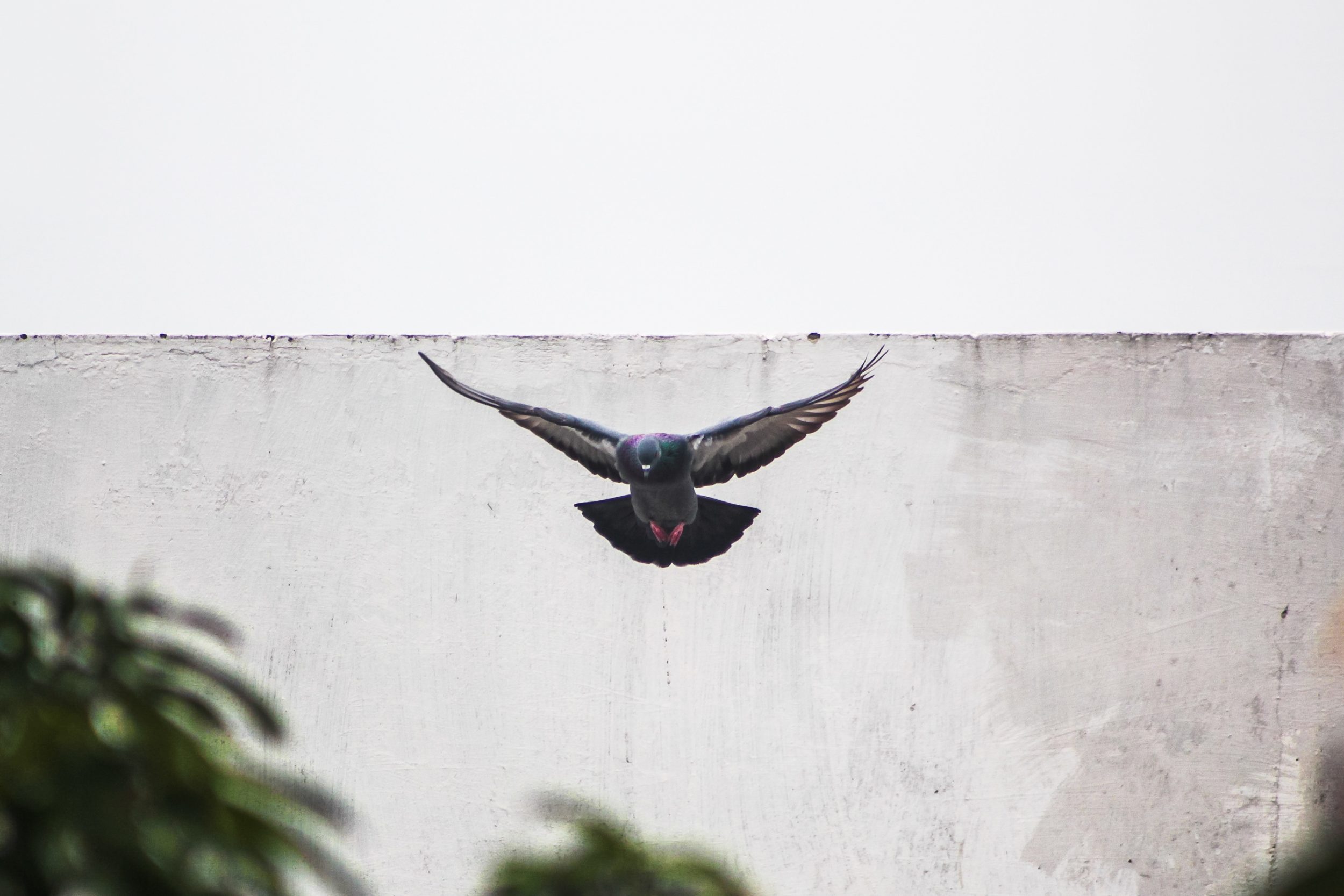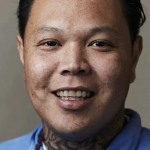Authors’ note: This essay was written by Kunlyna Tauch with assistance from Abigail Higgins.
Jaidyn Green says that there were times throughout her childhood when it felt like she had been sentenced to life without parole right alongside her father.
“My earliest memory I have with my dad takes place in prison, far away from home,” says the eighteen-year-old. “I was getting awards in school and had to take them to the visiting room to take pictures with him.”
Moments stick out to her: the time in second grade when she received awards for her reading and writing performance, the time she received a plaque engraved with the words “Star Student” in fifth grade.
“I used to get these awards for doing good and would think of two things. The first is to tell my mom, and then needing to take them to prison so dad can share in our joy,” she says.
Jaidyn says she couldn’t wait to get in the car and take the long drive to Calipatria State Prison to see her father. She fondly remembers taking pictures with him and rolling around on the floor in the kids’ area, where he’d teach Jaidyn and her sister, Jenesee, jujitsu moves while their mother, Sutina Green, looked on.
“It would almost feel normal,” Jaidyn says.
But even at such a young age, she knew it wasn’t. Guards loomed in booths, watching their every move. Vending machines lined up against the back of the visiting room were their only option for drinks or snacks. Other families were also stationed at tables with their incarcerated loved ones; they were surrounded by rows upon rows of tables, all filled with families trying to fit entire lives into timed visits. Jaidyn remembers that she felt confined—and that she just wanted her father home.
More from our decarceral brainstorm
Inquest, finalist for the 2025 National Magazine Award for General Excellence, brings you insights from the people working to create a world without mass incarceration.
Sign up for our newsletter to get the latest in your inbox every Saturday.
Newsletter
Jaidyn’s childhood unfolded in the thick of an impossible love story. Acquainted since junior high, Steven and Sutina were high school sweethearts in Long Beach, California. Like many adolescent relationships, they broke up before high school finished and lost touch soon after. Perhaps less characteristically, when they finally reconnected, Steven was serving a sentence of life without parole, often referred to as LWOP.
In January of 1992, with his eighteenth birthday just barely in the rearview mirror, Steven was charged with felony murder. Steven wasn’t the one who discharged the weapon—a friend who borrowed his gun did. That friend fled the country soon after and Steven, the only legal adult who was part of the altercation, faced the most jail time.
Eventually, Sutina got word that Steven was in prison, and they started exchanging letters. The letters were platonic—she was married and had just given birth to her first child—but the letters continued for years.
Steven hadn’t had much hope for the future—what future did he have, scheduled to die in prison? But Sutina’s letters and phone calls were a bright spot that made it feel like things could be different.
After her third child, Sutina’s marriage began to dissolve. When it ended in 2000, Steven convinced her to visit him. They’ve been together ever since.
“Steven’s my first love,” says Sutina. “Everyone makes sacrifices in life—obviously, some are bigger than others—and for me, this was a sacrifice I was willing to make. I loved him and I wanted to be with him and I was accepting of what my relationship was going to be.”
They fell in love in fifteen-minute increments, Sutina says of their timed and monitored phone calls. On the weekends, when she didn’t have her children (she shared custody with her ex-husband), Sutina made the four-hour drive, each way, to visit Steven. On one of those weekends—and then another, two years after that—Sutina became pregnant.
Steven and Sutina got married in between the births of their two children and, once the children were old enough, they joined their mother on her twice-monthly trek to the prison, located near California’s border with Mexico. Steven had his doubts—after all, he was going to be in prison for life. What kind of a father could he be?
“I tried to make life as normal as possible as I could for my kids,” says Sutina. “Obviously I’m bringing my daughters to a prison, but they were only coming every other weekend. So it wasn’t like every weekend they were subjected to prison.”
In many ways, Jaidyn and Jenesee’s experience isn’t unusual: 45 percent of U.S. adults have had an immediate family member incarcerated, and one in five have had a parent incarcerated.
“We tried to do the best we could with parenting. Steven was very involved in the girls’ lives,” says Sutina, adding that Steven would help with homework and reading and insisted the girls participate in jujitsu so he could hear about their tournaments and help them practice their moves.
But the burden weighed heavily; Steven wasn’t doing his time alone. The cost of his incarceration hit Sutina and his daughters hard. While people often consider the immediate people involved in a crime, it’s easy to forget the families on both sides.
Family members pay heavily for the price of incarceration—often literally. Statistics show that the average amount of debt for court and legal fees is $13,607. About 65 percent of families with an incarcerated member couldn’t afford basic needs like food, rent, and health care. This financial burden falls heavily on women, who are responsible for 83 percent of the costs associated with incarceration, such as collect calls, travel expenses, and providing necessities like food and toiletries.
“It’s a hard road and a hard relationship: we give a lot and they take a lot, because they can’t really give,” Sutina said.
In 2013 Steven was transferred to Ironwood State Prison, an eight-hour roundtrip drive from their home in Orange County. Sutina and the girls continued to make the trek.
Sutina says it cost around $1,000 every month to visit Steven: $100 each night for a hotel room for Friday and Saturday, $100 for gas round trip, $100 each day for vending machine food in the visitation room, and a little over $50 for fast food meals for dinner.
Added all up, physical contact with incarcerated loved ones is a luxury—one many cannot afford.
It wasn’t just the visits. Every three months, it cost another $200 to send Steven packages with hygiene products such as soap, deodorant, clothes, and the food he couldn’t get from the prison commissary’s extremely limited options, including the condiments that make prison food palatable.
While Sutina hoped for change, she also knew the situation she was in: Steven was never coming home.
“I knew what my reality was. This is what I was going to be doing for the rest of my life: visiting a prison,” says Sutina.
Jaidyn, however, had to grow into this reality. She says she sometimes felt envious of the relationship between her friends and their fathers. She hated feeling like her childhood was missing a critical piece; she didn’t feel like she could talk to anyone but her sister about that feeling.
Jaidyn says that throughout her childhood this confusion often bubbled over into rage—but she wasn’t always sure where to direct it.
“I used to be mad because he wasn’t out. I guess I did not fully understand it all then. All I knew was he wasn’t around and I wanted him to be. When they told me he couldn’t come home with us, it made me mad. I was mad at everything. I was mad at, like, the system, the courts—all of it.”
Sutina never lied to her children about why their father couldn’t live with them, nor did she tell them he’d be home soon. People make mistakes, and this particular mistake came to define much of their lives.
“We’ve always taught them to be honest and truthful, and we’ve always been honest and truthful with them,” says Sutina. “We’ve also explained that sometimes people do things that hurt other people and either they don’t mean to or they were mad in the moment and that’s not an excuse, but we also can’t judge people solely by one action.”
Jaidyn says that while she knew her father was doing the best he could with what he had, she also knew he couldn’t fully understand what they were all navigating.
“He didn’t understand what my mom was going through with us. I mean, we didn’t want to show him and we didn’t want to stress him out more than he already was—dealing with prison and all,” says Jaidyn.
Jaidyn says she was a little harder on her father than she should have been, causing a strain on their relationship.
“As a kid I saw things as black and white. My dad’s not here? Then it must mean that he doesn’t love us. How could he care if he’s not around?”
She says it was particularly confusing because she was learning about the importance of second chances at school and was wondering why her father wasn’t afforded the same grace.
“I started to challenge these concepts that just didn’t make sense to me. Good, bad, right, and wrong. I was just a kid trying to figure it all out,” says Jaidyn.
While Jaidyn was trying to figure things out, her mother’s activism was escalating. Prison wasn’t new to Sutina when she started her relationship with Steven: Both her brother and her father had been incarcerated. It wasn’t until Steven, however, that she felt the full weight of the carceral system and started her fight to change it.
Around 2010 Sutina got involved with The Place 4 Grace, a nonprofit that helps incarcerated parents stay in contact with their children. Through one of the organization’s programs, Family2Child Literacy Program, incarcerated parents in sixteen California prisons can record themselves reading a book to their children, after which the book and the recording are mailed to them. Another one of their programs is called Camp Grace, an opportunity for incarcerated parents to spend a week with their kids, doing things like playing catch or painting.
This is how I met Sutina Green—and how I eventually became a member of their family.
Sutina visited Pelican Bay Prison with The Place 4 Grace in 2017, where I was incarcerated. I immediately clocked her no-nonsense personality. That, plus the fact that she is Thai and I’m Cambodian, and we are both from Long Beach. We connected immediately.
“No matter what, from now on, we’re peeps,” she told me. And just like that, we were family. Sutina visited Pelican Bay every three months and we’d have occasional phone calls. Not long after, her husband and her daughters became my family too.
In 2017 Sutina banded together with several other wives and family members of men sentenced to LWOP to start an organization called Families United to End LWOP (FUEL). Sutina started thinking about what she could do to try and bring Steven home.
Sutina’s work took her up and down the state of California: if she wasn’t helping run camps and book recordings for The Place 4 Grace, she was fighting on a legislative front to end life-without-parole sentences and, she hoped, marginally widen the possibility that Steven might return home.
“I’m sure he caught some of it, but there was a lot he didn’t see or understand,” says Jaidyn of the way that her father perceived their life at that time. “Just imagine how hard it is to raise two teenage kids, provide for a husband in prison, have a full-time job, and fight for prison reform.”
Sutina’s activism could be hard on Jaidyn and Jenesee, which they all acknowledge. She was traveling to sixteen different California facilities and often had to ask her eldest daughter to care for herself and her sister while she was gone.
As the instances of LWOP commutations began to slowly increase—first a handful under Governor Arnold Schwarzenegger, and then more under Governor Jerry Brown—Sutina asked Steven if he’d consider applying.
Steven was resistant, insisting he wouldn’t apply and that anyone who had received a commutation so far must have been politically connected.
“He didn’t want to get the hope that something could possibly happen and then get it crushed,” says Sutina of Steven’s hesitancy.
But as they compared Steven’s case to other commuted cases, his seemed increasingly similar—and the hope that he could possibly come home felt less remote. Sutina hired a lawyer who walked them through the commutation process, and as she gained knowledge about the process, she hosted workshops for other families in the same position who couldn’t afford legal counsel.
In May 2018 Steven finally submitted his commutation. Seventy days later he received an interview. By November his sentence had been commuted. And by September 2019 he was home.
“My activism doesn’t stop. There’s so many deserving people who deserve the same opportunity that Steven had,” says Sutina, who is currently working for Human Rights Watch to end LWOP sentencing. “I’m glad Steven is in this fight with me. Whether he is or not, I still would be fighting. But it makes it so much easier to have him alongside me, helping me fight.”
There are currently over 5,000 people serving a life-without-parole sentence in California alone, and Sutina has certainly kept her promise, dedicating her work, with Steven by her side, to ending LWOP sentencing.
In fact, Sutina has been helping me pursue resentencing, in the hopes that I can get out before the decades-long end of my sentence—a possibility that seems closer than ever before given recent developments in my case, thanks in large part to Sutina’s support.
My relationship with the Greens means a lot to me. People in prison are labeled monsters, and Sutina decided to trust me to be a part of her family anyway.
When I think about the ways that Steven and Sutina managed to create a family in prisons—and the ways that, through them, I was able to find a family in prison—I also think about the families that were destroyed by what landed Steven and me in prison. Some 48,830 people were killed in the United States by gun violence in 2021 alone, and the number of lives each of those deaths impacted is inconceivable.
With the possibility of getting out, I’ve been thinking a lot about what amends look like, what restorative justice looks like, and what it means to live in service of the lives lost because of your crime.
It reminds me of Jaidyn, who wants to follow in her mother’s footsteps, becoming an activist working to change the U.S. carceral system. It’s a life path that means that much more coming from someone who grew up seeing the impact of activism—the late nights, the missed practices, the tireless work.
Maybe part of the answer is living a life like the Greens—committing to a life of service, following through on ending the systems that destroy so many lives.
This essay was produced and published in partnership with Empowerment Avenue.
Image: Milin John/Unsplash


